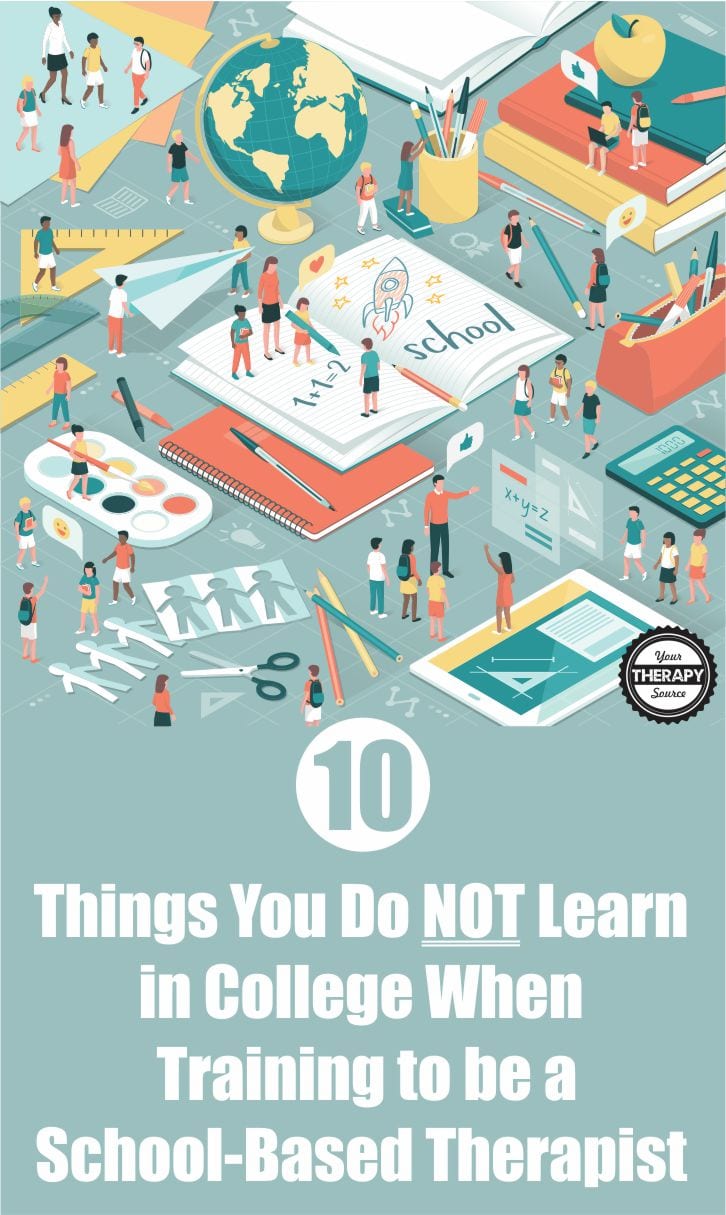Learning on the Job as a School-Based Therapist – 10 Things You Do Not Learn in College

Reflecting back on the more than 20 years since I graduated with my Master’s degree, I realize there are some crucial topics that were not mentioned during my training years. There is so much learning on the job as a school-based therapist (OT or PT)! Here are my thoughts on what the University forgot to mention about being a school-based therapist…
1. Dress appropriately: Schools are not very clean places. The floors get swept sometimes and polished about once a year. The best outfit you could wear would be comfortable clothes with reinforced knees. You spend a lot of time on the floor and I have ripped so many pairs of pants in the knees. Also, you may want to wear a tool belt or at least carry an Allen wrench set. I must have cut class the day they discussed how to repair wheelchairs on the fly.
2. Evacuation plans: I have worked in several different school systems and one area of concern is how to devise evacuation plans for students who cannot negotiate the stairs. Elevators turn off when fire alarms are pulled. The trickiest one I ever planned was for a third grade student with muscular dystrophy. She was independent with a motorized wheelchair, overweight and very low muscle tone. We had to plan not only how to get her down the stairs, but also where to seat her when she got downstairs. Then, how do we get her wheelchair down after that? You all know how much a motorized wheelchair weighs, right? I certainly do because I have carried one down flights of stairs more than a few times.
3. Public relations: As time goes by, more and more school staff do have the basic idea of what we do as school based therapists. When I first started, I would receive referrals for physical therapy evaluations where the only concern was poor handwriting. Part of the job of a school based therapist is to explain what type of help you can offer in the educational setting.
4. Clowning around: We discussed all sorts of syndromes, diagnoses and orthopedic conditions that effect children in pediatrics class. Children respond to play and silliness, no one ever went over with me how to act like a kid. Perhaps Intro to Clowning Around 101 would have been helpful to me.
5. Pediatric therex in real life: It is great to learn which therapeutic exercises are appropriate for children. We had lab class where we practiced our NDT techniques and observed normally developing children. Pediatric therex in real life means including play and toys in almost every activity that you do. A lesson in how to grow another arm to reach for a toy would have been of some assistance to me.
6. Scheduling: Do you know how difficult it is to schedule therapy for students with special needs? In a hospital, the patients are available for most of the day. If you miss one due to a medical test you simply check back later. In school, you cannot just check back later. You have to schedule therapy sessions around the main teacher’s schedule, special classes, maybe other therapies or nursing care. They may want to mention this during therapy training – perhaps organizational tips. Don’t forget to mention how to schedule a caseload that is spread out at many different schools. Multiple lectures and labs on how to provide OT or PT services within the classroom setting would have been amazing! If you are interested in providing push-in therapy services, but feeling overwhelmed and don’t know where to start, check out the Pushing Into the Classroom Webinar.
7. Driving, Parking and Getting Inside: It is hard enough to schedule the students for therapy, now try staying on schedule. I have had a therapy assignment where I was responsible for about 7 schools in an urban setting. You have to keep on schedule at each school, drive and park at each school. As a therapist, it was street parking for me. If I was lucky, I could find a spot right away, now it just meant gathering up all my equipment (therapy ball, toys, mat, etc.) and running inside to work with the student. Did I mention, school doors are all locked now. Perhaps a practice lab on how to carry tons of equipment and get buzzed into a school might be helpful.
8. The Therapy Room: I have worked in one school where I had a nice therapy room. All the others, I have made do with what they offer. I have worked with kids under stairwells, in large closets and hallways. We did have a nice carpeted room once but we got kicked out. Using a scooter board in the hallway was a little distracting for the children in Spanish class. Again, a practice lab could focus on how to work on large motor skills in a room that is 8 feet by 8 feet.
9. Documentation and Communication: In a school setting, communication among team members is crucial. I have learned throughout the years you can never communicate too much, just too little. Provide positive communication – don’t only discuss with the teacher or parent a child’s areas of weakness, focus on the child’s areas of strengths. If you need forms and templates to increase communication between school and home check out, School and Home Communication Forms for Therapists.
An in depth module or heck even a course for school-based therapy documentation would have been awesome! A SOAP note doesn’t come close to addressing the paperwork involved when writing IEPs, PLEPs, and progress monitoring.

10. Respect: Throughout my career, I have made every effort to be respectful to children, parents and school staff. Listen to what other team members have to say they have so much to offer since they are with the children for much longer than we are. One of the most important topics that a pediatric therapy class should stress is NEVER and I mean NEVER say to a child, parent or teacher that a child cannot do something especially learn how to walk. Children’s resilience and determination surprise me every day!
What is your #1 tip for learning on the job as a school-based therapist? Send us an email – we love to hear from our readers!

Are you new to school-based therapy or thinking of making the switch?
Feeling overwhelmed by huge caseloads, mountains of paperwork, and confusing lingo?
The School-Based Therapist Handbook webinar will help you feel more comfortable as you learn to deliver services in the school setting!
Presented by Laurie Gombash, PT, M.Ed., The School-Based Therapist Handbook Webinar includes a 3-hour on-demand webinar and a 20+ page printable resource pack.
Discover the secrets of an organized, effective school-based therapy practice! FIND OUT MORE.



